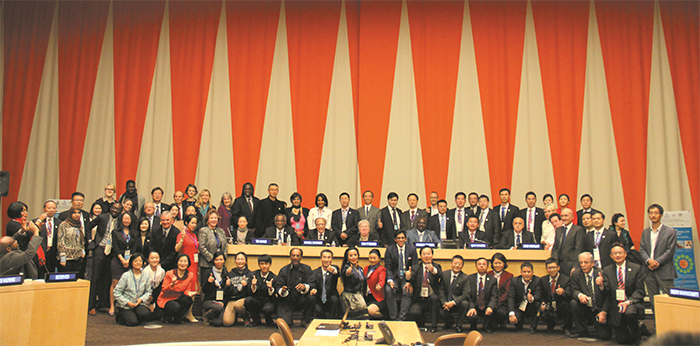Committed to Sustainable Cities and Human Settlements for All
In Special Consultative Status with ECOSOC
TENTH
GLOBAL FORUM ON HUMAN SETTLEMENTS
AND
TENTH ANNIVERSARY OF GFHS
“FROM SDGS TO NEW URBAN AGENDA - USHER
IN A NEW ERA FOR SUSTAINABLE CITY AND SUSTAINABLE URBANIZATION”
OUTCOME
DOCUMENT
2015 is a landmark year when the world
received a clear direction from the world leaders through the United Nations
for a transformative change towards sustainable development. Only a month ago,
the United Nations Sustainable Development Summit adopted the 2030 Agenda for
Sustainable Development. It highlighted
that: “This Agenda is a plan of action for people, planet and prosperity……we
pledge that no one will be left behind. ” and asserted that “The 17 Sustainable
Development Goals and 169 targets will stimulate action over the next fifteen
years in areas of critical importance for humanity and the planet.” The Goal 11
focused on the habitat agenda and committed to “making cities and human settlements
inclusive, safe, resilient and sustainable”.
2015 is also a critical year for the
preparation of the United Nations Conference on Housing and Sustainable Urban
Development (Habitat III) to be held from 17 to 20 October 2016 in Quito,
Ecuador leading to the adoption of New Urban Agenda. Against this background of
special significance, the 10th Global Forum on Human Settlements and 10th
Anniversary of GFHS (GFHS - X) both
focused on the relevant and related issues
in advancing sustainable city and sustainable urbanization as well as
observing the “World Cities Day 2015 at the headquarters of the United Nations
in New York on 29 and 30 October 2015. The gathering was one of the very first
events bringing partners from various backgrounds and handling various
responsibilities exchanged and shared information and ideas for the realization
of the SDGs and for the development of the New Urban Agenda. With cities
increasingly in the spotlight on the international stage, urban planning and
development has become a critical issue in the 2030 Agenda for Sustainable
Development.
GFHS - X brought together around 300
participants, including Ambassadors and diplomats representing UN Member
States, officials representing various entities of the UN system, recognized
experts, leading policy and decision makers from national and local
governments, business leaders, representatives of various international
organizations, NGOs and financial institutions. Through their participation and
contribution, we have further realized that urban growth at all costs needs not
be our destination.. The inevitable road we have to take is to make cities and
human settlements inclusive, safe, resilient and sustainable in support of
sustainable urbanization and ecological civilization for people and planet.
We therefore call for global actions:
1. To work tirelessly for the full and
effective implementation of the 2030 Agenda for Sustainable Development; to
actively disseminate information on SDGs and innovatively educate the public
particularly the youth and children; to guide the public to cultivate the
values and cultures of sustainability and engage in achieving the city we need.
2. To develop or revise overarching
strategy for the city sustainable management by integrating SDGs, the New Urban
Agenda as well as the aspirations of residents and stakeholders through
relevant participatory process, and establish laws and policies to ensure
effective implementation.
3. To foster a culture of inclusiveness and
integrate equity and equality into the urban development policies and agenda,
especially to pay attention to the needs of women and children in our rapidly urbanizing world, protecting them
from violence, abuse, exploitation,
neglect and discrimination; to provide all equal access to housing, education, health
care including mental health, sanitation, services for the elderly and
disabled, recreational facilities and other services public welfare and
well-being.
4. To carry out necessary political reforms
and effective governance structure, inspire creativity and create a development
model that is inclusive, innovative, dynamic and competitive; to engage in
important initiatives, such as "One Belt and One Road Initiative" by
China, enhancing interconnectivity of hard and soft infrastructure and
increasing opportunities for cooperation.
5. To provide affordable and adequate
housing for all; to ensure that the government plays a leading role in social
housing supply while guiding the responsible development of the housing market
and infrastructure..
6. To undertake long-term and scientific
planning of city, encourage innovative and passive building design, and ensure
effective implementation; to support and foster the emergence of more compact,
accessible, connected and mixed urban forms by controlling urban sprawl and
fragmentation.
7. To pursue harmonious coexistence between
human and nature by promoting sustainable use of terrestrial ecosystems and
halting biodiversity loss; to increase ratio of green space and build livable
communities.
8. To commit to developing and implementing
low-carbon and resource efficient urban development strategies, improving the
efficiency of traditional energy source, adopting relevant criteria and
standards, prioritizing policies and investments in public, non-motorized and
low-emission transport, building efficiency, renewable energy and efficient
waste management.
9. To better understand resources flows in
the urban metabolism and to use knowledge of resource flows from a consumption
and production perspective, especially to change the pattern of "Products
in Trash out" in current city operation and reduce waste from the source,
notably through a circular economy approach, whilst advocating green, moderate
and healthy life style.
10. To build up city resilience through
infrastructures and resource management to better deal with chronic stresses
and acute shocks due to climate change, natural calamity, and ecosystems
degradation; to recommend the construction of integrated underground pipe lines
and adopt the concept of low impact development.
11. To
develop interconnected greener cities by taking the momentum of internet and
big data revolution and investing in building information infrastructure for
making cities smarter and more efficient while promoting industry
transformation and upgrading.
12. To innovate and diversify financing
mechanism in support of adequate green infrastructure and public services
notably through Public-Private Partnership; to effectively guard against risk
from local-government debts.
13. To
develop and implement relevant laws and policies to promote sustainable
buildings and realize construction industrialization, while optimizing the
building material supply chain.
14. To
protect traditional culture and heritage and to attach great importance to the
conservation and development of historical town centers and ancient towns and
villages, by revitalizing and re-naturalizing them in a participatory manner.
15. To
enhance rural-urban connectivity to promote the coordinated development of
urban and rural areas; to encourage sustainable agriculture opportunities in
rural areas that help create sustainable livelihoods.
16. To
develop sustainable tourism projects that serve as a vehicle to alleviate
poverty, enhance indigenous settlements and protect biodiversity, increasing
vitality of rural areas which plays a critical role in reducing migration to
cities.
17. To
address the challenges, and seize the opportunities, in the coastal cities and
human settlements, aiming at achieving the Goal 11 and Goal 14 and their
respective targets as in the 2030 Agenda
through mutually reinforcing mitigation, adaptation or resilience actions*
Footnote:
*(Goal 14. Conserve and sustainably use the oceans, seas and marine
resources for sustainable development )





